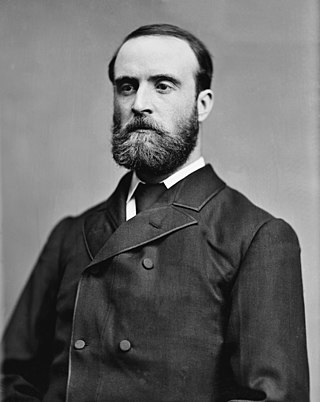Related Research Articles

Charles Stewart Parnell was an Irish nationalist politician who served as a Member of Parliament (MP) in the United Kingdom from 1875 to 1891, Leader of the Home Rule League from 1880 to 1882, and then of the Irish Parliamentary Party from 1882 to 1891, who held the balance of power in the House of Commons during the Home Rule debates of 1885–1886. He fell from power following revelations of a long-term affair, and died at age 45.

The 1876–77 United States Senate elections were held on various dates in various states, coinciding with Rutherford B. Hayes's narrow election as president. As these U.S. Senate elections were prior to the ratification of the Seventeenth Amendment in 1913, senators were chosen by state legislatures. Senators were elected over a wide range of time throughout 1876 and 1877, and a seat may have been filled months late or remained vacant due to legislative deadlock. In these elections, terms were up for the senators in Class 2.
The 1879 Ennis by-election was fought on 26 July 1879. The byelection was fought due to the death of the incumbent Home Rule MP, William Stacpoole. It was won by the Home Rule candidate James Lysaght Finegan.
The 1879 County Cork by-election was fought on 17 February 1879. The by-election was fought due to the death of the incumbent Home Rule MP, McCarthy Downing. It was won by the Home Rule candidate David la Touche Colthurst.
The 1877 Clare by-election was fought on 13 August 1877. The byelection was fought due to the death of the incumbent Home Rule MP, Sir Colman O'Loghlen. It was won by the Home Rule candidate Sir Bryan O'Loghlen. The result was remarkable in that O'Loghlen did not seek the nomination and was elected without his consent. He refused to take his seat as he was Attorney-General of Victoria. This position was considered an office of profit and thus disqualified him from membership of the House of Commons. A select committee was established to consider the issue and reported in 1879. They found that this was the case and the seat was declared vacant. Some controversy remained because O'Loghlen's position was in a colony and not in the United Kingdom. A writ was moved for another by-election in 1879.
The 1877 North Northamptonshire by-election was fought on 13 August 1877. The by-election was fought due to the death of the incumbent Conservative MP, George Ward Hunt. It was won by the Conservative candidate Brownlow Cecil.
The 1877 Westminster by-election was fought on 11 August 1877. The by-election was fought due to the incumbent Conservative MP, William Henry Smith, becoming first Lord of the Admiralty. It was retained by the incumbent.
The 1877 Great Grimsby by-election was fought on 1 August 1877. The by-election was fought due to the death of the incumbent Conservative MP, John Chapman. It was won by the Liberal candidate Alfred Watkin.
The 1877 Huntingdonshire by-election was fought on 29 June 1877. The by-election was fought due to the death of the incumbent Conservative MP, Henry Carstairs Pelly. It was won by the Conservative candidate Viscount Mandeville.
The 1877 Dungarvan by-election was fought on 23 June 1877. The byelection was fought due to the death of the incumbent Home Rule MP, John O'Keeffe. It was won by the Home Rule candidate Frank Hugh O'Donnell.
The 1877 Montgomery Boroughs by-election was fought on 15 May 1877. The by-election was fought due to the succession to a peerage of the incumbent Liberal MP, Hon. Charles Hanbury-Tracy. It was won by the Liberal candidate Hon. Frederick Hanbury-Tracy who was a lieutenant-colonel in the Worcester Yeomanry.
The 1877 Salford by-election was fought on 19 April 1877. The by-election was fought due to the death of the incumbent Conservative MP, Charles Edward Cawley. It was won by the Conservative candidate Oliver Ormerod Walker.
The 1877 Launceston by-election was fought on 3 March 1877. The by-election was fought due to the resignation of the incumbent Conservative MP, James Henry Deakin (junior). It was won by the Conservative candidate Sir Hardinge Stanley Giffard.
The 1877 Oldham by-election was fought on 1 March 1877. The byelection was fought due to the death of the incumbent Conservative MP, John Morgan Cobbett. It was won by the Liberal candidate J. T. Hibbert.
The 1877 Halifax by-election was fought on 20 February 1877. The by-election was fought due to the resignation of the incumbent Liberal MP, John Crossley. It was won by the Liberal candidate John Dyson Hutchinson.
The 1877 Wilton by-election was fought on 19 February 1877. The by-election was fought due to the resignation of the incumbent Liberal MP, Sir Edmund Antrobus. It was won by the Conservative candidate Hon. Sidney Herbert.
A by-election was held on 20 January 1877 for the UK House of Commons constituency of County Waterford to fill the vacancy caused by the death of Home Rule League MP Sir John Esmonde, one of the two members returned in the 1874 general election. The by-election was won by the Home Rule candidate, James Delahunty.
A by-election took place in County Sligo on 12 January 1877. It was fought due to the death of the incumbent Conservative MP, Sir Robert Gore-Booth. It was won by the Home Rule League candidate Edward King-Harman.
The 1875 Meath by-election was fought on 17 April 1875. The by-election was fought due to the death of the incumbent Home Rule MP, John Martin. It was won by the Home Rule candidate Charles Stewart Parnell.
The 1874 County Louth by-election was fought on 8 April 1874. The by-election was fought due to the double Election, chose to sit for Dundalk of the incumbent Home Rule MP, Philip Callan. It was won by the Home Rule candidate George Harley Kirk.